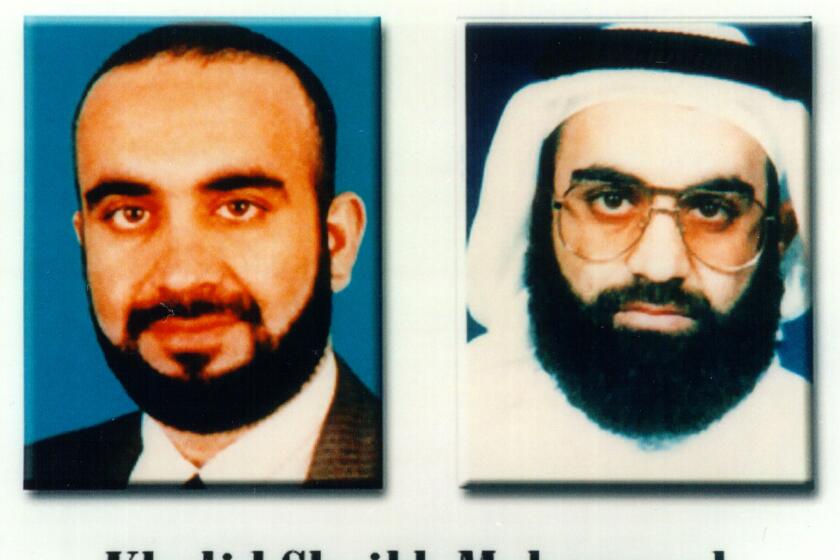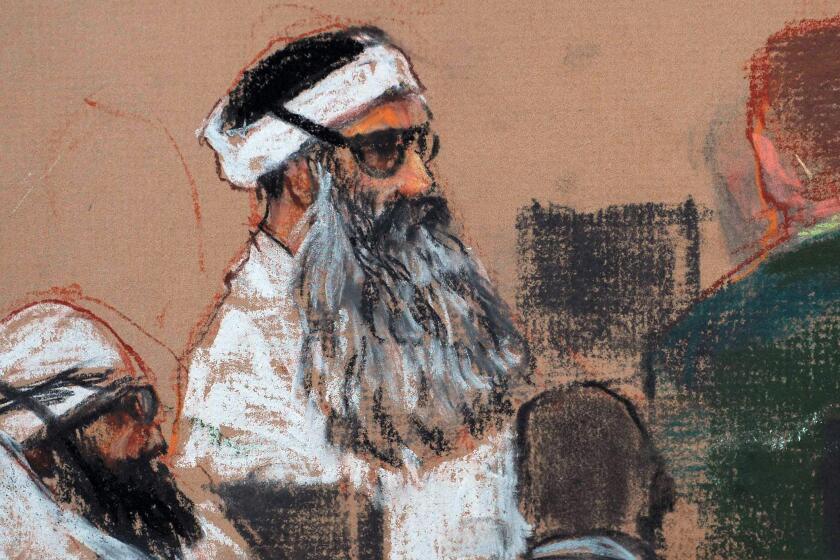The Biden administration succeeds in temporarily blocking a plea deal for alleged 9/11 mastermind

- Share via
WASHINGTON — The Biden administration succeeded Thursday in temporarily blocking Khalid Shaikh Mohammed, accused of being the mastermind behind the 9/11 attacks, from entering a guilty plea in a deal that would spare him the risk of execution for Al Qaeda’s Sept. 11, 2001, attacks.
It is the latest development in a long struggle by the U.S. military and successive administrations to bring to justice the man charged with planning one of the deadliest attacks ever on the United States. It stalls an attempt to wrap up more than two decades of military prosecution beset by legal and logistical troubles.
A three-judge appeals panel agreed to put on hold Mohammed’s guilty plea scheduled for Friday in a military commission courtroom at the U.S. naval base in Guantanamo Bay, Cuba.
In an unusual move, the Biden administration is pushing to throw out a plea agreement that its own Defense Department had negotiated with Mohammed and two 9/11 co-defendants.
Mohammed is accused of developing and directing the plot to crash hijacked airliners into the World Trade Center and the Pentagon. Another of the hijacked planes flew into a field in Pennsylvania.
Journalist Terry McDermott has spent the better part of two decades chasing Khalid Shaikh Mohammed, the self-professed mastermind of the Sept. 11 attacks. What drives him, and what has he learned?
A small number of relatives of some of the nearly 3,000 victims already had gathered in Guantanamo to hear Mohammed take responsibility in one of the most painful chapters in American history.
“It’s very upsetting,” said Elizabeth Miller, who lost her firefighter father, Douglas Miller, in the attacks and leads a group of 9/11 families supporting the plea agreements and opposing execution for the defendants.
She sees the deals as “the best way for families to receive finality.”
“It’s unfortunate that the larger government isn’t recognizing it,” she said by phone Thursday from Guantanamo.
But Gordon Haberman, whose daughter, Andrea, was killed at the World Trade Center while on a business trip, took heart. “If this leads to a full trial for these guys, then I’m in favor of that,” he said.
The appeals panel stressed that its order would hold only as long as it took to more fully consider arguments and that it should not be considered a final ruling. The court scheduled some of the next steps for Jan. 22, meaning the fight would extend into the Trump administration.
Defense lawyers had worked to wrap up the pleas by President-elect Donald Trump’s Jan. 20 inauguration. It’s unclear whether Trump would seek to intervene in the military commission’s work.
Defense Secretary Lloyd J. Austin III has led the fight to overturn the politically divisive plea deals, saying a decision on the death penalty in an attack as grave as Sept. 11 should only be made by the Defense secretary.
Defense lawyers said in filings that attempts to throw out the agreement is the latest in the government’s two decades of “fitful” and “negligent” mishandling of the case. They say that the deal is already in effect and that Austin has no legal authority to throw it out after the fact.
The fight has put the Biden administration at odds with the U.S. military officials it appointed to oversee justice in the attacks.
The deal, negotiated over two years and approved by military prosecutors and the Pentagon’s senior official for Guantanamo in late July, stipulated life sentences without parole for Mohammed and two co-defendants. It also obligates them to answer any lingering questions that families of the victims have about the attacks.
Legal and logistical challenges have bogged down the 9/11 case in the 17 years since charges were filed against Mohammed. The case remains in pretrial hearings, with no trial date set. The torture of Mohammed and other 9/11 defendants in CIA custody has posed one of the biggest obstacles, potentially rendering their later statements unusable in court.
With that in mind, military prosecutors notified families this summer that the senior Pentagon official overseeing Guantanamo had approved a plea deal. They called it “the best path to finality and justice.”
Defense Secretary Austin overrides plea agreements for alleged 9/11 mastermind Khalid Shaikh Mohammed and co-defendants, reinstating death penalty cases.
Austin unexpectedly announced Aug. 2 that he was scrapping the agreement. After the Guantanamo judge and a military review panel rejected Austin’s intervention, the Biden administration went to the District of Columbia federal appeals court.
Mohammed’s attorneys argued that Austin’s “extraordinary intervention in this case is solely a product of his lack of oversight over his own duly appointed delegate,” meaning the senior Pentagon official overseeing Guantanamo.
The Justice Department said that if the guilty pleas were accepted, the government would be denied a chance for a public trial and the opportunity to “seek capital punishment against three men charged with a heinous act of mass murder that caused the death of thousands of people and shocked the nation and the world.”
Knickmeyer and Peltz write for the Associated Press and reported from Washington and New York, respectively. AP writer Tara Copp at Ramstein Air Base, Germany, contributed to this report.
More to Read
Sign up for Essential California
The most important California stories and recommendations in your inbox every morning.
You may occasionally receive promotional content from the Los Angeles Times.












